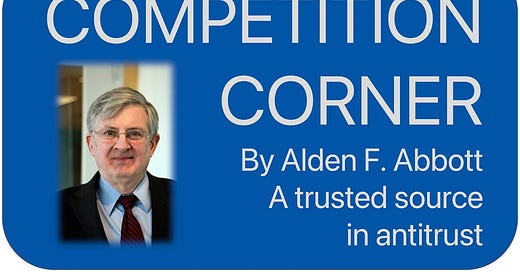I hope that everyone had a joyous Thanksgiving.
Believers in market-oriented empirically-based competition and consumer protection policies have a number of things to be thankful for.
Neither the July 2023 draft FTC-DOJ merger guidelines, nor the FTC’s January 2023 proposed competition rule on non-compete clauses have been finalized, perhaps reflecting the serious scholarly substantive critiques they have drawn from learned commenters.
FTC announcements regarding various possible Magnuson-Moss consumer protection rules have not yet led to final concrete rule proposals, perhaps due to the requirement that Magnuson-Moss rules must pass muster under cost-benefit analysis.
And the poor FTC’s penchant to bring merger cases based on aggressive theories but poor facts (see here), testifies to the fact that neo-Brandeisian “sound and fury” does not control federal judicial decisions.
The fact remains, however, that the radical enforcement policy messaging by the FTC and DOJ (whether concerning mergers, unfair methods of competition, or the Robinson-Patman Act) will, at the margin, discourage some efficiency-seeking business conduct, to the detriment of consumer welfare and economic efficiency.
And the current agency leadership is going nowhere (at least not yet). Thus, it is right to be thankful, but a solid dose of realism should curb our enthusiasm about the current state of the American antitrust enterprise. (For more on this sad state of affairs, I commend to you Dan Gilman’s latest witty evaluation of the latest installments in the Biden Administration’s antitrust reign of error, at Truth on the Market.)
During November I was busy on the speaker circuit, discussing standard essential patent policy at an IP Watchdog Conference and holding forth on AI and antitrust at the NYU Global Antitrust Economics Conference. In addition, on November 13 ITIF posted my podcast conversation with Shanker Singham, highlighting our book on anticompetitive market distortions.
At Truth on the Market, I published a critique of the Biden Executive Order on Artificial Intelligence (AI) that highlights the Order’s costly regulatory features – and its misguided approach to antitrust. This is the first sally in what I hope will be a stream of articles on the AI-antitrust interface. My colleague, Satya Marar, is hard at work on a detailed policy primer on the topic, which we hope will be released early next year.
Other Mercatus colleagues have also been busy tackling competition-related issues across various industries. Senior Scholar Thomas Hoenig recently appeared before the House Financial Services Subcommittee on Financial Institutions and Monetary Policy to comment on the impact of risk-weighted capital standards on resilience in the banking sector. Also, check out Senior Scholar Erik Matson’s commendable takedown of the myth that early American history vindicates renewed populist calls for destructive tariffs that stifle competition in the name of protecting vested interests, published in the National Review.
In December, I expect to provide you with an early holiday treat (an online public good) by releasing a Mercatus policy brief on FTC reform. Whether you agree or disagree with my twelve reform proposals, I think you will find them provocative.
See you all in cyberspace next month!





